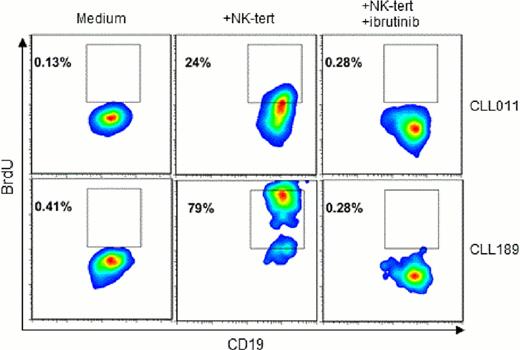Abstract
Abstract 2903
Bruton tyrosine kinase (BTK) is a component of the B-cell receptor signaling pathway. Ibrutinib (previously known as PCI-32765), a first in class, covalent BTK inhibitor, has demonstrated significant clinical activity against CLL in early clinical trials. Understanding the molecular mechanisms of action would shed light on CLL pathophysiology and provide additional opportunities for the development of new therapies.
The anti-tumor activity of ibrutinib in CLL has been investigated previously using either an ex vivo approach or a mouse model (Herman et.al, Blood. 2011;117:6287–96 and Ponader et.al, Blood. 2012;119:1182–9). In this study, we have chosen, instead, a patient-oriented in vivo approach by using samples from an ongoing phase 1b trial of ibrutinib (NCT01105247). We prospectively collected serial samples from CLL patients (n=14) before and at several time points after the initiation of therapy and analyzed them for cellular and molecular signaling events.
We demonstrated that levels of the phosphorylated BTK protein (p-BTK) in CLL cells from treatment-naïve patients were significantly higher than in normal B cells, explaining why CLL cells are more susceptible to BCR inhibition than normal B cells. Response assessments, performed at the end of cycle 2 (∼Day 56), demonstrated nodal responses in all patients by CT scan. Ex vivo apoptosis did occur but required high concentrations of ibrutinib (>500 nM). In addition, in vivo apoptosis was rarely observed in serial peripheral blood samples collected from treated patients. With these serial samples, we found that the population of Ki67+ cells were gradually decreased over a 28-day ibrutinib treatment course. Using a newly established co-culture system that induces CLL proliferation in vitro, the analysis of several parameters, including Ki-67 expression, cell growth and bromodeoxyuridine (BrdU) incorporation (shown in the figure), revealed that the proliferation of CLL cells was directly inhibited by ibrutinib (200 nM). Furthermore, activities of BTK and downstream signaling events, such as the phosphorylation of PLCg2, AKT and ERK, were all suppressed over time in ibrutinib-treated patients.
With primarily an in vivo approach, we have demonstrated that the blockage of cell proliferation was a major effect of ibrutinib against leukemic CLL cells. Blocking cell proliferation via inhibition of BTK-mediated signaling concurs with clinical responses in ibrutinib-treated CLL patients.
Leonard:Pharmacyclics Inc.: Consultancy, Honoraria. Buggy:Pharmacyclics: Employment, Equity Ownership.
Author notes
Asterisk with author names denotes non-ASH members.


